Discover top guides, trends, tips and expertise from AIO Writers

Picture this: You’re a talented content writer, but your work isn’t getting the traction it deserves.
Despite offering great information, you’re having trouble attracting an audience.
If so, then maybe you should consider publishing more long-form content. According to a serpIQ study, the average content length of the top 10 results in Google was more than 2,000 words. The number one spot typically has 2,416 words!
But creating great long-form content that ranks is easier said than done.
How do you write incredible long-form content that gets real results?
The right tools can give you the leg up you need to get it done.
This brings us to our topic: must-have tools for SEO content writers.
This blog post will help you create great content using SEO content writing tools. We’ll discuss the most important tools that every aspiring or seasoned marketer should have in their toolkit, plus how you can become a proficient SEO content writer.
Table of Contents:
- What’s the Must-Have Tool for SEO Content Writers? Start Here
- Do Content Writers Need to Know SEO?
- How Do I Become a Good SEO Content Writer?
- Why You Need Content Writing Tools for SEO
- Conclusion
Do Content Writers Need to Know SEO?
As a content writer, understanding SEO is crucial for your success.
Why?
- Increased Visibility. Firstly, well-optimized content ranks higher on search engines like Google and Bing. This means more visibility and traffic for your website or blog.
- Better User Experience. Optimizing content is not just for search engine ranking. Aim to always please your reader by creating engaging, relevant material that solves a problem or helps make their lives better.
- Higher Conversion Rates. Last but not least, good SEO practices lead to better conversion rates as users find what they’re looking for with ease.
Screenshot from Backlinko
What’s the Must-Have Tool for SEO Content Writers? Start Here
What is the most important tool in SEO?
Short answer: In SEO, there is no “one tool to rule them all.”
Instead, the most important tool in SEO is the one that helps you meet your goals.
There are a lot of them out there, and most will help you with at least some aspects of SEO. (No single tool covers absolutely everything — there are too many moving parts.)
The best tools for SEO depend on your specific needs and preferences. Here are some widely recognized tools across different categories:
Measurement & Analytics Tools
Google Analytics: This must-have tool for SEO content writers provides insights into website traffic, user behavior, conversion tracking, and more. It helps you understand how users interact with your website and measure the effectiveness of your SEO efforts.

Screenshot from Google Analytics
Google Search Console: Another must-have tool for SEO content writers, this free tool from Google helps you monitor and maintain your website’s presence in search results. It provides data on search impressions, click-through rates, indexing status, and more. It also helps you identify and fix technical issues that may affect your site’s performance.
Keyword Research & SEO Tools
Semrush: A comprehensive SEO suite that offers features like keyword research, competitor analysis, backlink analysis, site auditing, rank tracking, and more. It provides valuable insights and recommendations to optimize your website’s SEO performance.
Ahrefs: This must-have tool for SEO content writers is great for competitive analysis, keyword research, backlink analysis, and rank tracking. It offers a vast database of keywords and backlinks, allowing you to uncover valuable insights to enhance your SEO strategy.
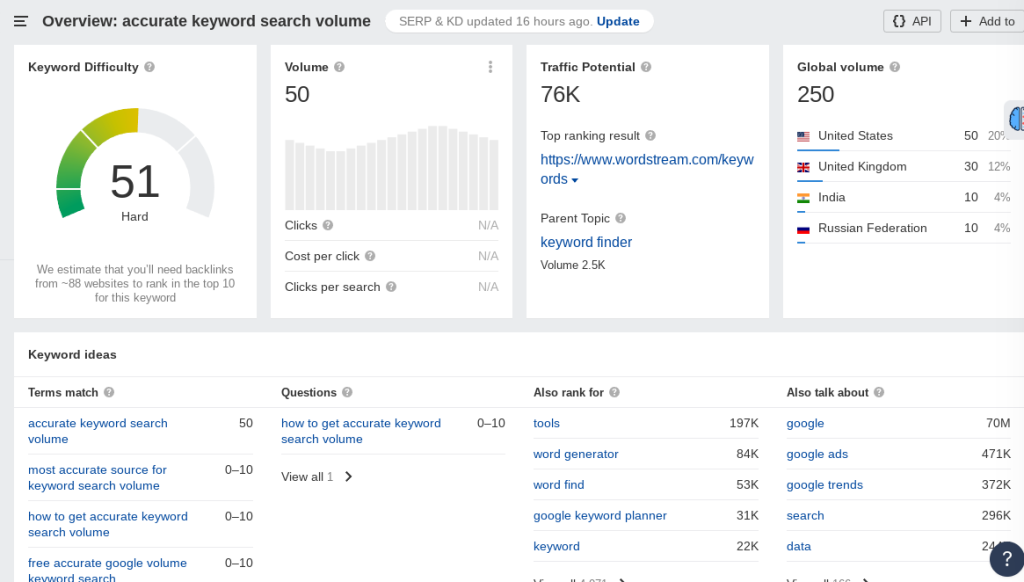
Screenshot from Ahrefs
Moz: Moz offers a suite of SEO tools, including keyword research, link analysis, site auditing, and rank tracking. The Moz Pro tool provides in-depth SEO insights and recommendations to improve your website’s visibility in search engines.
Google Keyword Planner: A free tool within Google Ads that provides keyword ideas, search volume data, and competition levels so you can find relevant keywords to target in your SEO efforts.
Optimization Tools
Yoast SEO: A widely used WordPress plugin that has become a must-have tool for SEO content writers, Yoast is a big help with on-page SEO. It offers features like content analysis, XML sitemap generation, meta-tag optimization, and readability checks. Yoast SEO provides real-time suggestions to improve the SEO-friendliness of your content.
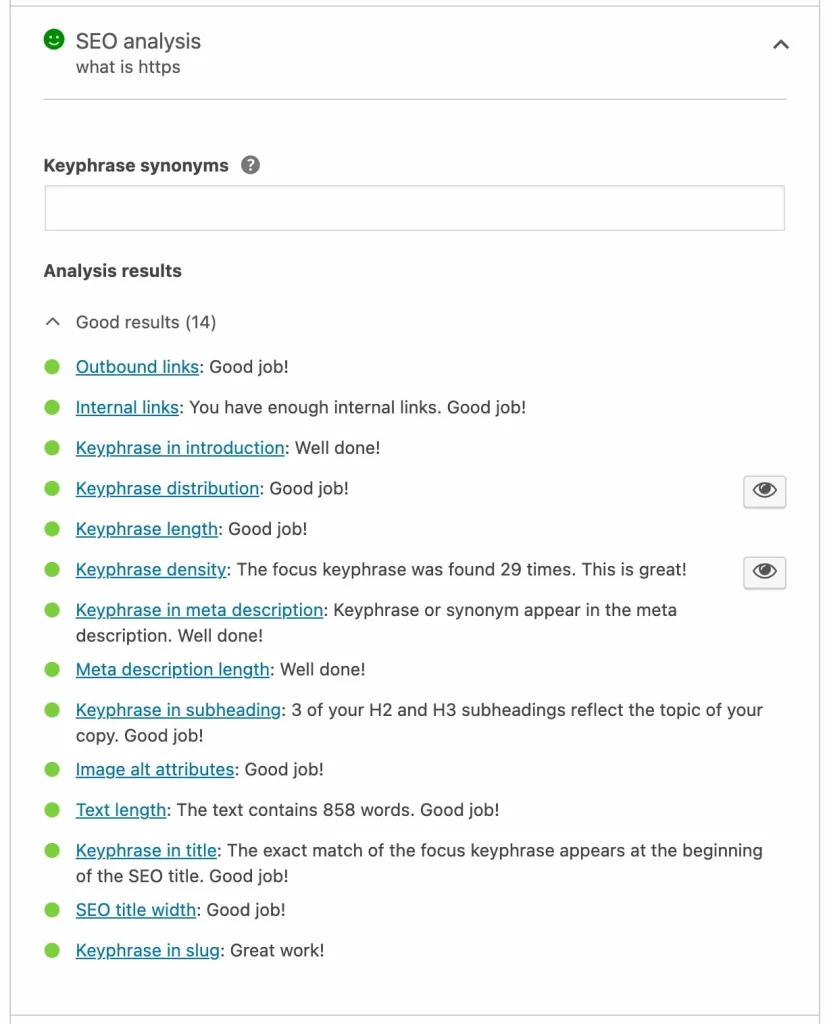
Screenshot of Yoast SEO in WordPress
Rank Math: Another WordPress plugin, Rank Math helps you optimize your content inside the WordPress editor. It keeps track of keyword usage, links, and more for perfectly optimized posts.
Content Research Tools
BuzzSumo: A tool for content research and analysis. It helps you identify popular and trending topics, analyze social media engagement, find influential content creators, and discover backlink opportunities.
Quora: Need to know which topics in your niche people are talking about, including the terms they’re using to describe them? Quora has all of this chatter and more, which can be valuable when you’re researching content.
Learn how to use Quora to boost your SEO in this guide.
Exploding Topics: Want to jump on trends before they’re hot? Exploding Topics helps you find the hot content topics that are about to explode in popularity so you can cover them before anyone else.
 More tools for specific SEO tasks from Oberlo
More tools for specific SEO tasks from Oberlo
Content Management Tools
When it comes to content planning and creation, tools such as Trello, Asana, and Airtable can help you organize your ideas, create outlines, and keep track of your progress.
Google Docs is also a must-have tool for SEO content writers not just for text editing but also for organizing content. It’s free, easy to use, and allows you to collaborate with other writers in real-time.
AI Writing Assistants
Another must-have tool for SEO content writers is an SEO writing assistant, such as Grammarly, Hemingway, or Quillbot. These apps can help improve your writing and ensure an error-free output.
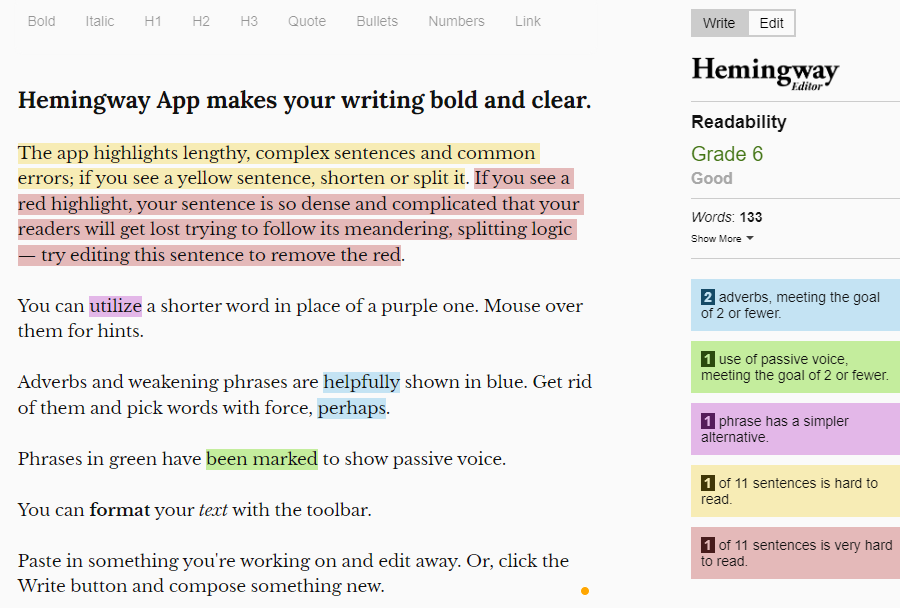
Content Promotion Tools
Finally, don’t forget to promote your content through platforms like Hootsuite and Buffer. These tools help you engage with your audience and track results.
Bonus Tool: All-in-One Content Marketing Automation Tool
One type of tool that has been making waves in the area of content marketing is the AI writer. Powered by artificial intelligence, platforms like BrandWell are now helping human writers produce hundreds of blog articles within minutes without sacrificing quality.
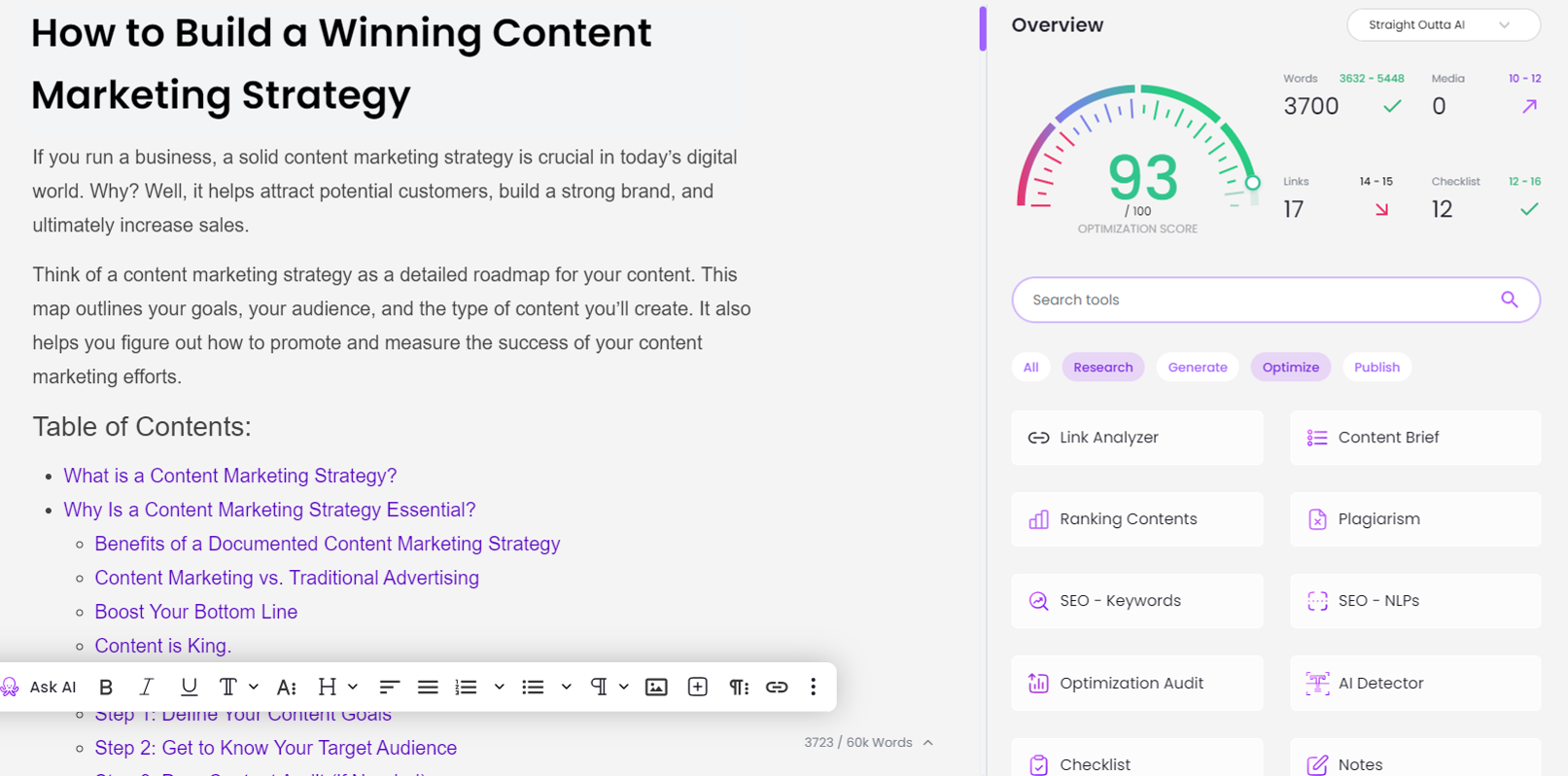
If you’re suffering from writer’s block, BrandWell is the best way to help you power through. Just enter the long-tail keyword that you want to rank for and the machine will do the rest.
BrandWell can write a long-form blog article in under 5 minutes! It’s well-researched, well-written, properly formatted, and fully optimized for search engines. The text editor includes a comprehensive SEO suite with dynamic SEO scoring, keyword recommendations, AI-generated SEO metadata, an SEO checklist, content optimization audits, and even a keyword research tool built inside the app. It’s also the only AI tool that can be trained to write in your voice so your blog posts sound exactly like you instead of a robot.
More than just an SEO content writer, BrandWell is a brand growth solution. The AI analyzes your web pages and tells you which ones need to be refreshed in order to rank higher and generate more traffic and revenue.
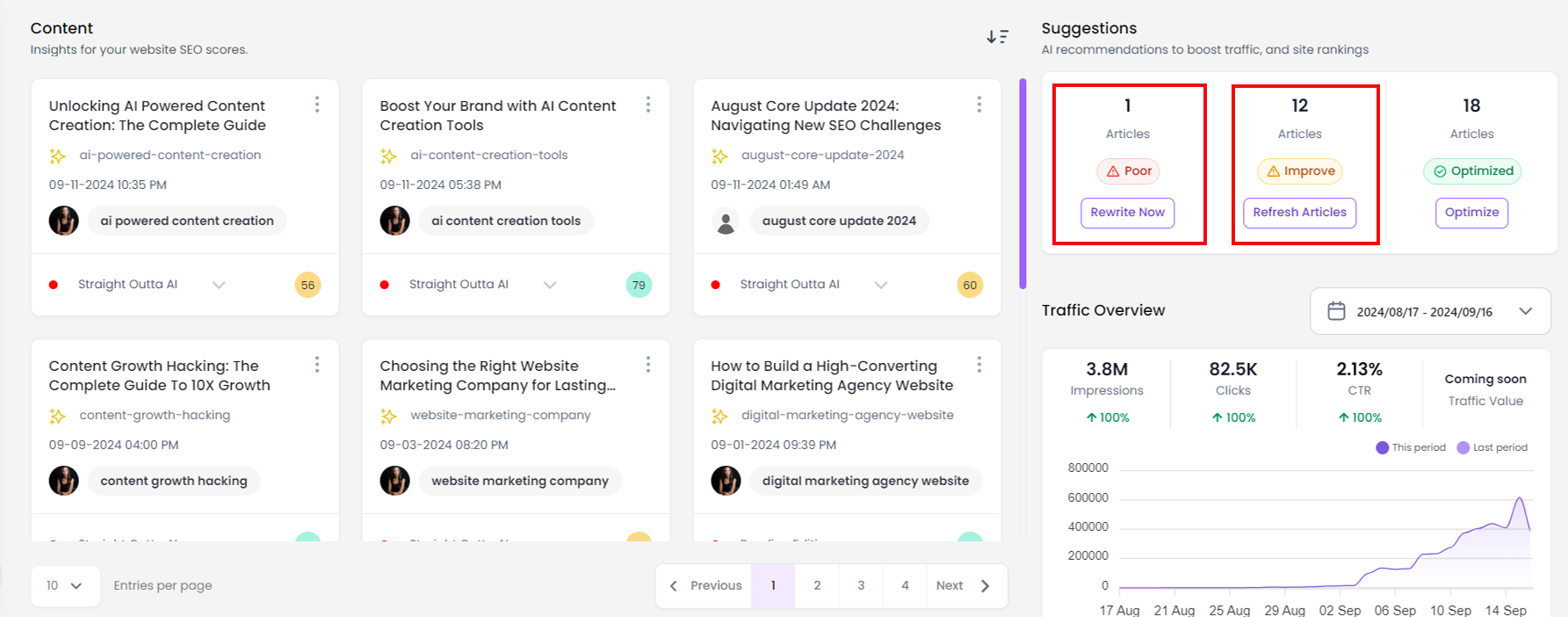
With its combination of speed, quality, and ease of use, BrandWell has become a must-have tool for marketers and business owners who want to scale their content marketing efforts and grow their brands without hiring more people.
How Do I Become a Good SEO Content Writer?
Becoming a good SEO content writer requires a combination of writing skills and an understanding of SEO principles. Here are some steps to help you on your journey to becoming a skilled SEO content writer:
- Develop your writing skills: Focus on improving your grammar, vocabulary, sentence structure, and overall writing style. Read extensively and practice writing regularly to refine your skills.
- Understand SEO fundamentals: Familiarize yourself with the basic concepts of SEO, including keyword research, on-page optimization, backlink building, and user experience. Learn about search engine algorithms and how they determine search rankings.
- Conduct keyword research: Always start with keyword research. Analyze your audience’s needs by researching popular search terms related to your topic. Learn how to identify relevant keywords that align with your writing content and have a good search volume.
- Create high-quality, engaging long-form content: Focus on producing well-researched, informative, and engaging content that provides value to your readers. Make sure your content is original, well-structured, and easy to read. Incorporate relevant keywords naturally into your content without overstuffing them.
- Optimize your content for search engines: Apply on-page SEO techniques to improve the visibility of your content in search engine results. This includes optimizing meta tags (title tags and meta descriptions), using header tags (H1, H2, etc.), formatting your content for readability, and including relevant internal and external links.
- Develop a strong understanding of user intent: Consider the search intent behind a user query and create content that satisfies their needs. Understanding user intent will help you produce content that aligns with what people are looking for and increase your chances of ranking higher in search results.
- Stay up to date with SEO trends: SEO practices evolve over time, so it’s important to stay informed about the latest trends and algorithm updates. Follow reputable SEO blogs, attend webinars, and join online communities to keep yourself updated with industry news and best practices.
- Analyze and measure your results: Use SEO analytics tools to monitor the performance of your content. Analyze data such as organic traffic, keyword rankings, and user engagement metrics to understand what works and what needs improvement. Adjust your strategies accordingly to optimize your content’s performance.
- Learn and adapt: SEO is a dynamic field, so be prepared to adapt to changes and learn continuously. Experiment with different techniques, stay curious, and always be willing to expand your knowledge and skills.
Remember, becoming a good SEO content writer takes time and practice. Be patient, persistent, and committed to honing your skills, and you’ll gradually improve your expertise in creating content that is both user-friendly and optimized for search engines.
Why You Need Content Writing Tools for SEO
Content writing tools for SEO are valuable because they streamline the optimization process and help writers create content that is more likely to rank well in search engine results. Here’s why content writing tools are essential for SEO:
- Keyword targeting: SEO content writing begins with identifying the right keywords to target. Keyword research tools provide insights into search volume, competition, and related keywords. They help writers find relevant keywords that have the potential to attract organic traffic and optimize their content accordingly.
- On-page optimization: Tools like SEO plugins or content analysis tools help writers optimize their content for search engines. They provide suggestions to improve factors such as meta tags, headings, keyword density, internal linking, and readability. These tools ensure that content meets SEO best practices, making it more likely to rank higher in search results.
- Competitor analysis: Content writing tools often offer features to analyze competitors’ content. Writers can gain insights into what’s working well for competitors, identify content gaps, and find opportunities to create unique and engaging content. This competitive analysis helps in crafting a content strategy that stands out and attracts more visibility.
- Backlink analysis: Backlinks are crucial for SEO success. Backlink analysis tools help writers identify and analyze their backlink profile and that of their competitors. They provide information about link sources, anchor text, and the quality of backlinks. This helps in developing a strong link-building strategy and monitoring the effectiveness of existing links.
- Content planning and organization: Content writing tools often include features to plan, organize, and collaborate on content projects. They help writers keep track of topics, deadlines, and progress. These tools facilitate efficient content creation and ensure consistency and coherence across various pieces of content.
- Performance monitoring: SEO content writing doesn’t end with publishing. Monitoring the performance of published content is crucial to understand its impact. Tools like analytics platforms help writers track key metrics like traffic, engagement, conversions, and keyword rankings. This data allows for continuous optimization and improvement of content strategies.
Content writing tools for SEO simplify the optimization process, enable efficient content creation, and provide valuable insights to improve search engine visibility. By utilizing these tools, writers can produce content that meets SEO requirements, attracts organic traffic, and helps achieve better search engine rankings.
Invest in at Least One Must-Have Tool for SEO Content Writers
Having the right content writing tools can greatly enhance the productivity and effectiveness of content writers. Whether you’re an aspiring writer or a seasoned professional, investing in must-have tools can make your writing journey smoother and more rewarding.
From keyword research and SEO optimization to content analysis and competitor research, there are various tools available to support content writers in their quest for success. Tools like Google Analytics, Semrush, and Yoast SEO can provide valuable insights and recommendations to improve your content’s visibility and performance.
But if your meager budget allows you to pick only one tool, then consider BrandWell as your first must-have tool for producing SEO content that ranks well. It has everything you need from keyword research and competitor analysis to long-form writing, SEO, and publishing.
Remember, finding the best tools for your specific needs and preferences is key. So, don’t hesitate to explore different options and experiment with various tools until you find the perfect fit. With the right tools in your arsenal, you’ll be equipped to create engaging, optimized content that captivates your audience and drives results.

UNLOCK YOUR POTENTIAL
Long Headline that highlights Value Proposition of Lead Magnet
Grab a front row seat to our video masterclasses, interviews, case studies, tutorials, and guides.




